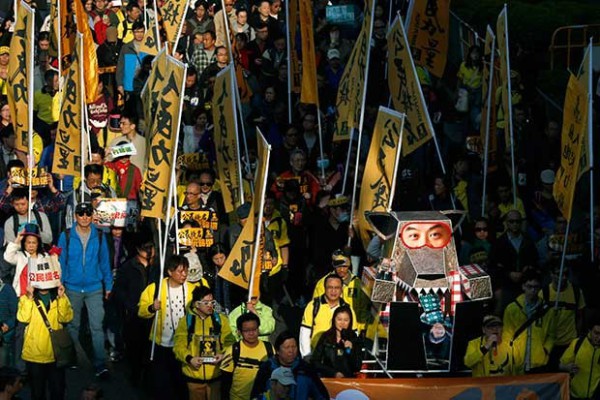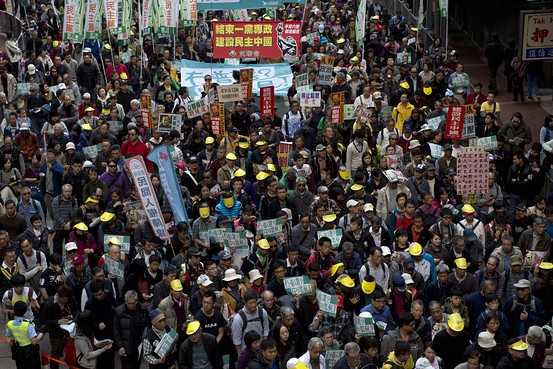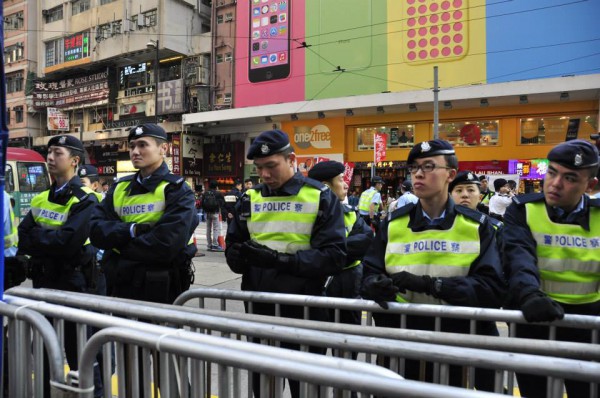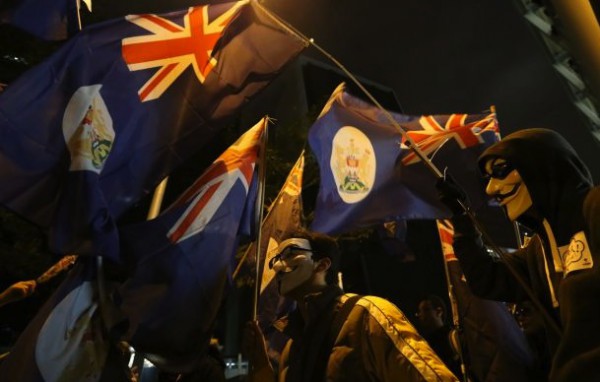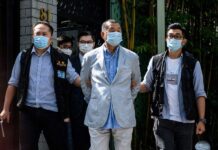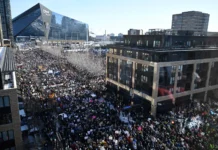Between 20,000 and 30,000 march on New Year’s Day, but frustration and divisions are rising within the pro-democracy struggle
Dikang, Socialist Action (CWI) in Hong Kong
Thousands again took to the streets of Hong Kong to demand genuine universal suffrage on the annual New Year’s Day march against the city’s unelected Beijing-imposed government. But this year’s turnout was well down on the 130,000 who marched a year ago (although that was a record mobilisation for 1 January), and this is a reflection of a more complicated situation that has developed, with the emergence of sharp tensions and contradictions within the democracy movement.
This is at a time when the struggle against the current undemocratic electoral system is entering a critical conjuncture in the countdown to the next Chief Executive election of 2017, in which for the first time all registered voters will be able to take part. Despite this, the electoral system (designed largely by Britain) allows the Chinese dictatorship to override the votes of the populace through elitist big business dominated political structures. The public were led to believe the 2017 vote would be ‘free’ i.e. non-manipulated, and there is growing anger as it becomes clear that yet another fraud is about to perpetrated. At the same time, Beijing is escalating its threats and admonishments, branding any challenge to its position as “unpatriotic” and “unconstitutional.”
Numbers on demonstrations cannot be taken as the only gauge of the popular mood or willingness to engage in struggle. But nevertheless the dip in numbers to 13,000-16,000 according to the University of Hong Kong, or even the 30,000 cited by the organisers (the Civic Rights Front and Alliance for True Democracy), is a warning, and poses serious questions about the way the democracy struggle is being conducted by its de facto leadership, which is dominated by the ‘moderate’ pan democratic parties, especially the Democratic Party (DPHK). As the Front’s spokesman Yeung Ching-yin commented to The Standard newspaper, the lower turnout, “illustrated that some people think marching is not enough to express anger…” Socialists would add that what is needed are not merely events to “express anger” but a credible fighting strategy and methods that can inflict defeat upon the government.
The sharply lower turnout on the New Year’s Day demo is a sign of faltering confidence among sections of the population over whether real democratic change can be achieved on the basis of six-monthly street protests, despite the monumental size of some protests (430,000 on last July 1, and similar numbers one year earlier). There is a growing frustration over the lack of fight from the pan democratic leaders, whose search for a compromise with the Chinese ‘Communist’ (CCP) dictatorship is becoming increasingly obvious. This is reflected in a lowering of their political demands for the new electoral system and in putting less and less emphasis on mass mobilisation to challenge the government.
The supporters of the CWI in Hong Kong, Socialist Action, have consistently explained that the CCP regime will not be coaxed or persuaded by ‘reasoned’ arguments into granting genuine universal suffrage in Hong Kong, or any other territory it rules over. Any ‘compromise’ therefore – by accepting and adapting to the CCP’s continued dictatorial rule – can only result in a rehash of the current undemocratic system. Cosmetic changes are possible, but not fundamental change. To achieve real change the dictatorship must be defeated, which is only possible through mass struggle in Hong Kong, embracing more effective methods such as a mass political strike against the government, but also crucially reaching out towards the oppressed masses in mainland China to build a united struggle for democratic rights and the end of authoritarian rule.
Occupy Central
The unelected Hong Kong government of CY Leung can draw little comfort from the lower turnout on the 1 January demonstration. As even Lau Siu-kai, the former head of the main pro-government think-tank warned, “The government has no room for complacency… opinion polls have shown growing discontent.”
CY’s administration is beset by problems on every front, from an economic slowdown and explosive wealth gap, to corruption-tainted ministerial resignations and collapsing public support. Polls show CY’s approval rating hit 40.6 (on a scale of 0 to 100) in November, the lowest for any Chief Executive since the mass movement of 2003, which pushed then leader Tung Chee-hwa through the exit doors. The Chinese regime’s continued blackballing over universal suffrage is a source of deepening outrage. Such anger, and demands for CY’s resignation, were in full view on the demonstration. What is needed, however, is a strategy to take the struggle forward, something that until now has been lacking.
At last year’s 130,000-strong demonstration the idea of ‘Occupy Central’ was in its infancy. This is a plan for an indefinite mass occupation of the main business district, initially planned to start in July of this year, immediately after the annual July 1 democracy march. In the year that has passed, the ‘OC’ movement has been launched, initially attracting widespread enthusiasm among youth and the activist layer within the democracy struggle. Socialist Action welcomed the proposal to occupy and have played an active role in this campaign, while also pointing out that its does not go far enough (an occupation can be a useful springboard, but an escalation to mass walkouts and strike action by students and workers will be needed). We also criticise the shortfalls in the programme of the ‘OC’ leadership, dominated by the ‘moderate’ pan democrats, which blurs rather than clarifies which electoral forms and rules are needed to put an end to the CCP’s dictatorial control.
Unfortunately, in the recent period the ‘OC’ leadership have further toned down any fighting talk, both in terms of the scope and organisational lines of the occupation and by further muddling their demands in respect of the 2017 election. Under the pressure of the Chinese state and its marionette Hong Kong administration, but also crucially under the pressure of the Hong Kong capitalist class, which has denounced the ‘disruption’ of an occupation and historically has always been hostile to universal suffrage, the ‘OC’ leaders have wavered and taken steps backward that risk dissipating the support for an occupation.
Threat of a crackdown
The tone of the pro-government camp with most of the media in its pocket has progressively become more strident, warning an occupation will lead to “turmoil” and raising the bogey of “hostile foreign forces” at work (by implication the US and British governments, despite their lacklustre support for democracy). Some pro-Beijing politicians have hinted at a possible crackdown by [Chinese] PLA troops. CY has stated that it is “impossible” for the occupation to be “lawful or peaceful”. Ostensibly spontaneous pressure groups – set up in reality by the pro-government camp – have been formed to oppose the occupation, aiming to attack and provoke physical confrontations as a pretext for a police crackdown against the occupation. These groupings have become more confident and assertive in the recent period, for the first time setting up stalls – a blatant act of provocation – along the 1 January march route.
Establishment pressure has been piled upon the pan democratic and ‘OC’ leaders to renounce “violence and law breaking,” the real aim of which is to pressure some of these leaders to break with the idea of occupation. This ‘anti-violence’ propaganda shows limitless hypocrisy coming from the same pro-government politicians that either deny or defend the horrendous bloodbath in Beijing of June 4 1989.
Rather than undermine the arguments for a genuinely democratic election system, the establishment’s political scare campaign has further incensed wide layers of the population, especially youth. With clear and firm leadership, the support for the occupation and a more far-reaching strategy to challenge the dictatorship would be growing by leaps and bounds. Unfortunately, this is not the case. Under this establishment pressure there are signs of growing hesitancy from the ‘OC’ and pan democratic tops, and more active efforts to find an illusory compromise over the electoral mechanisms for 2017. We repeat: any compromise with the CCP dictatorship, as demonstrated so many times before, will be largely cosmetic and on its own terms.
The ‘OC’ leadership recently announced the occupation may now be postponed until March 2015, from July 2014, to await the government’s consultation process and its report. But this ‘consultation’ is a charade, the latest of many, with the government having already made up its mind. The bogus nature of the consultation exercise is recognised even by Anson Chan, a former Chief Secretary (head of Hong Kong’s government bureaucracy), who called the consultation “dishonest and misleading.”
“It’s clear, both from the government document and recent comments from officials, that the parameters for the implementation of universal suffrage have already been drawn up and are heavily influenced by the central authorities in Beijing,” Chan said.
Whereas under certain conditions the timing of mass protests may change, the bureaucratic top-down manner in which this decision was announced makes a mockery of the ‘OC’ leaders previous commitment to discuss all issues democratically. This approach to mass struggle – as if it is a tap to be turned on and off – completely contradicts the experience of recent huge protest movements for example in Turkey and Brazil in 2013.
Postponement could lead to demoralisation and make it more difficult to mobilise in future. This, however, suits some of the right-wing pan democratic leaders who in reality are extremely reticent towards the idea of occupation, which they fear could slip out of their control. Rather than build for a serious challenge to the government they seek a limited and symbolic occupation enabling them to say “we tried”. An apologetic tone permeates the speeches of some pan democratic leaders, imploring the government not to “force us” to start the occupation.
This lack of a fighting approach has in turn led to increasing polarisation and frustration within the broad ranks of the democracy movement. This is reflected in numerous ways, with an increasingly vocal ‘nativist’ fringe (right-wing anti-mainlander racists), and other more radical groups who unfortunately do not as yet offer a coherent alternative strategy to that of the current leadership, or grasp the need for democratic structures to organise the struggle.
Public nomination versus elite committee
The central dispute between the pro- and anti-democracy camps today is the question of the nomination process for Chief Executive candidates. The CCP and its echoes in Hong Kong are insisting on a nomination committee, the role of which will be to screen out ‘undesirable’ candidates. This committee will be modelled on the current elitist and grotesquely undemocratic Election Committee, comprised of 1,200 unelected luminaries and dominated by the big capitalists, which installed CY in power two year ago.
To give the appearance of “listening to the people” the regime may agree to expand this committee and incorporate a directly elected element into its make-up, while keeping its in-built pro-government majority. One way or the other, the CCP will insure it maintains ultimate control. Its ‘ace card’ in the current debate with the pan democratic leaders is that a nomination committee is enshrined in Hong Kong’s mini-constitution, the Basic Law, alongside more recent rulings from the Chinese regime’s rubber-stamp National People’s Congress (NPC). This ‘constitutional’ argument is wielded like a magical ‘red card’ by Beijing to disqualify any proposals it dislikes. So far this legalistic sorcery is working, because the pan democratic leaders are under its spell and slavishly adhere to the Basic Law.
Instead of rejecting these undemocratic rules, or even proposing a constitutional amendment, the pan democratic leaders have allowed themselves to get sucked into pointless discussions and ‘interpretations’ of what the Basic Law does or does not allow. Yet this is a completely elitist official document, drafted a quarter of a century ago by representatives of the CCP dictatorship and Hong Kong’s capitalist tycoons, and then imposed undemocratically upon the people. Its main aim was to guarantee the capitalist system, which cannot be challenged until 2047 according to the Basic Law. That the same document is full of authoritarian features is no coincidence.
The main pan democratic parties, who have banded together in the Alliance for True Democracy, call for ‘public nomination’, meaning the right of candidates to be directly nominated by collecting a certain number of signatures. But at the same time these parties are not opposing Beijing’s nomination committee. This ‘hedged position’ is an attempt by these politicians to create a negotiating platform, for some form of dual procedure combining direct (public nomination) and indirect (nomination committee) nomination. Socialist Action has criticised this standpoint, which firstly sows illusions in the CCP regime’s willingness to compromise (it is adept at offering the appearance of compromise – but will not give up control), and secondly serves as a line of retreat for the right-wing pan democratic leaders (which we are already seeing) to drop the idea of public nomination and accept the nomination committee which, in the CCP’s hands, will be used to eliminate any genuine challenge from forces or political figures outside the Chinese regime’s control.
CCP spokespeople have repeatedly made clear they will not accept public nomination, which “violates” the Basic Law. Most recently, one of CY’s top officials, Chief Secretary for Administration Carrie Lam Cheng Yuet-ngor, dismissed the idea of public nomination as “beyond imagination.” This was in response to an opinion poll organised in the form of a ‘mock referendum’ by the Occupy Central campaign on 1 January. The poll, conducted mainly online and through smart phones, attracted 62,000 votes. Of these, 94 percent voted in favour of “an element of public nomination” for the elections. The use of a deliberately vague formulation – “an element of…” – is a further sign of the compromise soundings coming from the ‘OC’ leaders. But, confirming our warnings, even this watered down position was given short shrift by the government.
Thus, the pan democratic leaders have led themselves into a negotiating trap, where the most likely result, unless a momentous movement from below interrupts this process, will be a rotten compromise based on largely decorative ‘democratic’ modifications to the elite-dominated nomination committee, enabling the Chinese dictatorship to continue to control the electoral process.
What next after 1 January?
The lower turnout on New Year’s Day is a sign that the democracy struggle has entered a more complex phase, with a greater political fragmentation of both the establishment and anti-government camps and sharply contradictory moods even among the activist layer. This does not represent a definitive ebb in the mass struggle, however, but it does expose the political weaknesses of the democracy movement’s current pro-bourgeois leaders and their inability to mount an effective challenge to the CCP. Last October’s huge protest movement over the government’s media monopoly policies and refusal to grant a broadcasting license to HKTV, in which around 230,000 people took part in three successive demonstrations, shows the readiness of broad layers to come out against the government. Significantly, the pan democratic leaders did not initiate that movement and kept a low profile, in keeping with their desire to lower popular expectations and demobilise the masses rather than seriously prepare for the coming collision over universal suffrage.
That a more complex situation has emerged was shown in the make-up of the 1 January demo. The ‘OC’ leaders, having announced the postponement of the struggle to 2015 in favour of ‘consultation,’ announced they would not even take part in the New Year’s Day demonstration. This was an unhelpful and confusing signal to the general public about the importance of the protest. Despite this, two ‘OC’ leaders were platform speakers at the rally after the demo, and their proposals for ‘passive resistance’ were allowed to dominate the rally. Rally participants were asked to lie down flat on the ground to rehearse ‘non-violent’ resistance to police arrests. Such ideas flow from the ‘Gandhiist’ approach of the ‘OC’ leaders, although theirs is a very one-sided interpretation of India’s struggle for independence from Britain, which succeeded as a colossal mass movement, embracing strikes, rural uprisings, and mass civil disobedience, in an international environment of revolutions against colonialism. The struggle was not therefore limited to the contradictory ‘non-violence’ theories of Mahatma Gandhi (Gandhi defended the use of violence and even state repression on some occasions).
The ‘OC’ leaders’ approach fails to take into account the increasing threat from pro-government vigilante-type groups, which are likely to be used against the occupation as a precursor to a police crackdown. Socialist Action does not advocate violence; we stress the need for well-organised and disciplined mass mobilisations as the most effective form of struggle. This includes the need for self-defence through the formation of a stewarding force and security patrols under the democratic control of the occupation. Socialist Action has called for trade unions in Hong Kong to pledge strike action as a response, if state-sponsored violence or repression is used against an occupation, citing the example of Turkish public sector trade unions in the mass movement of 2013.
Loaded questions
LSD legislator ‘Long Hair’ Leung Kwok-hung was one of many who criticised the smartphone ‘referendum’ organised by the ‘OC’ leadership. While he called upon people to cast a vote, he argued the emphasis on the poll cut across participation in the demonstration. Others went further, challenging the equivocal way that two of the three ‘referendum’ questions were formulated, implicitly accepting a nomination committee. [The three propositions were: 1) That the representativeness of the nomination committee should be increased (!), 2) That there should not be pre-screening in the nomination process, 3) That the nomination process should include an element of civil nomination (!)]
In addition to online voting, polling stations were set up at the march assembly point, Victoria Park, and some youth heckled the organisers and urged people not to vote in the poll as this would endorse its compromise formulations. At the final rally, Democratic Party leader Emily Lau Wai-hing was booed by a section of the crowd for saying universal suffrage “could still be achieved without public nomination.” Her statement let the cat out of the bag – that the Democratic Party tops are preparing a ‘compromise’ to ditch public nomination altogether in exchange for a re-worked nomination committee. This is not even ‘partial democracy,’ again showing that ‘compromise’ is a euphemism for capitulation.
It is the backsliding of the pan democratic leaders that has opened a space allowing the colonial flag-waving ‘nativists’ to gain a foothold. This loose network, mostly active on social media, advocates Hong Kong identity and autonomy from China, but combines this with racist denunciations of mainlanders, even criticising the demo organiser, the Civic Rights Front, as a “pro-China organisation.” While their numbers in the demonstration were actually down on one year ago, the nativists have grown more vocal. A group calling themselves ‘Hong Kong Comes First’ unfurled roll-ups during the January 1 rally with racist anti-mainlander slogans (attacking “locusts”) and brought bags of tomatoes to throw. Richard Tsoi Yiu-cheong, the vice chairman of the Democratic Party, was surrounded and threatened by ‘nativist’ protesters, not because of his party’s support for a rotten electoral compromise with the CCP, but because he recently sponsored a court challenge by a mainland Chinese migrant against discriminatory welfare rules, which led to mainland migrants winning access to Hong Kong’s extremely low social security [so-called CSSA] payments.
While the nativist forces are still small, their growth represents yet another obstacle to the struggle for democratic rights against the CCP regime and capitalist Hong Kong establishment. In December, the same group staged an incursion into the PLA military garrison in Hong Kong brandishing the British colonial flag. This action, by just three individuals and their camera operator, purely in pursuit of publicity, was entirely negative and counterproductive from the standpoint of the struggle against CCP rule, and has been used by China’s state media to discredit the wider democracy struggle in Hong Kong as ‘pro-foreigner’. At the same time, however, the arrest and possible harsh punishment of these activists (whose action was peaceful) must be opposed, and it must be pointed out that much of the criticism of the garrison protest from the pan democratic tops is actually aimed at discrediting ‘radical protest’ in general.
Paradoxically, we see the emergence of right-wing racist and chauvinist groupings in both the pro-China and pro-Hong Kong camps, both of which can be manipulated by the ruling class in an attempt to split and derail mass anti-government protests. The emergence of such groups is one symptom of the political complications that have arisen as a result of the leadership vacuum in the democracy struggle. These groupings also meet little or no opposition on their core ideological ground – xenophobia – because of the refusal of most pan democratic parties and even ‘left’ groupings to openly challenge racism and organise against it. The supporters of Socialist Action, through our campaign Youth Against Racism, have been among the very few to raise our voices on this decisive issue, staging protests and calling for united struggle against capitalism and dictatorship.
In identifying key problems in the current political conjuncture, above all the lack of a fighting leadership for the democracy struggle, the supporters of Socialist Action are confidant that new forces will come forward and draw the necessary political conclusions to create an unstoppable mass democracy movement. As we have explained, the key forces for this task are the working class and the youth, in Hong Kong but also in China, and success rests upon the creation of a mass working class party. If the masses are cheated again in the ‘Battle of 2017’ this will create an explosive backlash against the dominant right-wing pan democratic leaders as well as against the government.
The struggle against the CCP dictatorship cannot be separated from the struggle against capitalism, with the Hong Kong tycoons working hand-in-glove with the dictatorship to guarantee their super-profits. Socialists combine active participation in today’s struggles for even partial democratic and social advances, with consistent campaigning to show that genuine democratic rights and a secure livelihood are impossible without abolishing capitalism and building democratic socialism.

